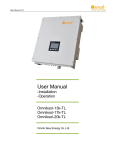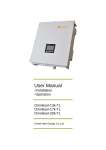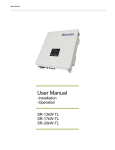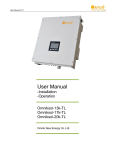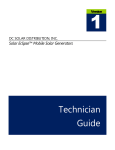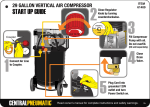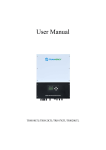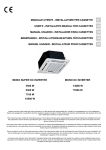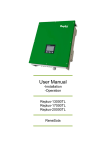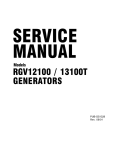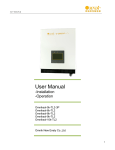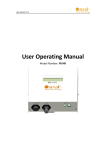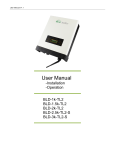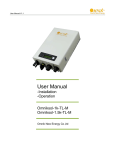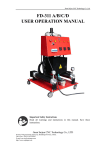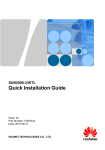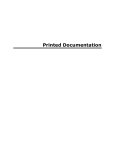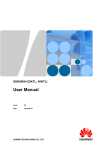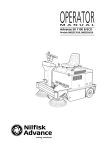Download User Manual
Transcript
User Manual V3.2 User Manual -Installation -Operation 13k-TL 17k-TL 20k-TL User Manual V3.2 Catalog 1. 2. 3. 4. 5. 6. 7. Notes on this manual ............................................................................................................................... 3 1.1 General notes ...................................................................................................................................... 3 1.2 Symbols Used ...................................................................................................................................... 3 1.3 Target Group........................................................................................................................................ 4 Preparation ................................................................................................................................................ 5 2.1 Safety Instructions ............................................................................................................................... 5 2.2 Explanations of Symbols on Inverter ................................................................................................... 7 Product Information ................................................................................................................................. 8 3.1 Overview .............................................................................................................................................. 8 3.2 Major Characteristics ........................................................................................................................... 9 3.3 Technical Data ..................................................................................................................................... 9 Packing checklist ................................................................................................................................... 11 4.1 Assembly parts .................................................................................................................................. 11 4.2 Product Appearance .......................................................................................................................... 12 4.3 Product Identification ......................................................................................................................... 14 4.4 Further Information ............................................................................................................................ 14 Installation ............................................................................................................................................... 15 5.1 Safety ................................................................................................................................................. 15 5.2 dimensions, weight ............................................................................................................................ 15 5.3 Mounting Instructions......................................................................................................................... 16 5.4 Safety Clearance ............................................................................................................................... 17 5.5 Mounting Procedure .......................................................................................................................... 17 Electrical Connection ............................................................................................................................. 20 6.1 Safety ................................................................................................................................................. 20 6.2 Overview of Connection Area ............................................................................................................ 20 6.3 DC Side Connection .......................................................................................................................... 21 6.4 AC side connection ............................................................................................................................ 24 6.5 Communication and Monitoring connector ........................................................................................ 27 Display ..................................................................................................................................................... 28 7.1 Main interface .................................................................................................................................... 28 7.2 LCD Display ....................................................................................................................................... 29 7.2.1. Curve .............................................................................................................................................. 30 1 User Manual V3.2 7.2.2. Parameters ..................................................................................................................................... 35 7.2.3. Tools & Options .............................................................................................................................. 37 7.2.4. Information ...................................................................................................................................... 41 7.2.5. Error ................................................................................................................................................ 42 7.2.6. Update ............................................................................................................................................ 43 7.3 State Information ............................................................................................................................... 43 8. Monitoring system.................................................................................................................................. 45 9. Recycling and Disposal ......................................................................................................................... 47 10. Troubleshooting ..................................................................................................................................... 48 11. Warranty .................................................................................................................................................. 50 12. Abbreviation ............................................................................................................................................ 51 2 User Manual V3.2 1. Notes on this manual 1.1 General notes The main purpose of this User’s Manual is to provide instructions and detailed procedures for installing, operating, maintaining, and troubleshooting the following three types of Solar Inverters: 13k-TL 17k-TL 20k-TL Please keep this user manual all time available in case of emergency. 1.2 Symbols Used DANGER DANGER indicates a hazardous situation which, if not avoided, will result in death or serious injury. WARNING WARNING indicates a hazardous situation which, if not avoided, can result in death or serious injury or moderate injury. CAUTION CAUTION indicates a hazardous condition which, if not avoided, can result in minor or moderate injury. NOTICE NOTICE indicates a situation that can result in property damage, if not avoided. 3 User Manual V3.2 1.3 Target Group Chapter 1, 2, 3, 4, 7, 8, 9, 10 and Chapter 11 are intended for anyone who is intended to use Grid Tie Solar Inverter. Before any further action, the operators must first read all safety regulations and be aware of the potential danger to operate high-voltage devices. Operators must also have a complete understanding of this device’s features and functions. WARNING Do not use this product unless it has been successfully installed by qualified personnel in accordance with the instructions in Chapter 5, “Installation”. Chapter 5 and Chapter 6 are only for qualified personnel who are intended to install or uninstall the Grid Tie Solar Inverter. Installation must be suitable to the on-site conditions and comply with local regulations and technical rules. NOTICE Hereby qualified personnel means he/she has the valid license from the local authority in: • Installing electrical equipment and PV power systems (up to 1000 V). • Applying all applicable installation codes. • Analyzing and reducing the hazards involved in performing electrical work. • Selecting and using Personal Protective Equipment (PPE). 4 User Manual V3.2 2. Preparation 2.1 Safety Instructions DANGER DANGER due to electrical shock and high voltage DO NOT touch the operating component of the inverter, it might result in burning or death. TO prevent risk of electric shock during installation and maintenance, please make sure that all AC and DC terminals are plugged out. DO NOT stay close to the instruments while there is severe weather conditions including storm, lighting etc. WARNING The installation , service , recycling and disposal of the inverters must be performed by qualified personnel only in compliance with national and local standards and regulations. Please contact your dealer to get the information of authorized repair facility for any maintenance or repairmen. Any unauthorized actions including modification of product functionality of any form will affect the validation of warranty service; BLD may deny the obligation of warranty service accordingly. 5 User Manual V3.2 NOTICE Public utility only The PV inverter designed to feed AC power directly into the public utility power grid,do not connect AC output of the device to any private AC equipment. CAUTION The PV inverter will become hot during operation; please don’t touch the heat sink or peripheral surface during or shortly after operation。 Risk of damage due to improper modifications. Never modify or manipulate the inverter or other components of the system. 6 User Manual V3.2 2.2 Explanations of Symbols on Inverter Symbol Description Dangerous electrical voltage This device is directly connected to public grid, thus all work to the inverter shall only be carried out by qualified personnel. DANGER to life due to high electrical voltage! There might be residual currents in inverter because of large capacitors. Wait 10 MINUTES before you remove the front lid. NOTICE, danger! This device directly connected with electricity generators and public grid. Danger of hot surface The components inside the inverter will release a log of heat during operation, DO NOT touch aluminum housing during operating. An error has occurred Please go to Chapter 10 “Trouble Shooting” to remedy the error. This device SHALL NOT be disposed of in residential waste Please go to Chapter 9 “Recycling and Disposal” for proper treatments. Without Transformer This inverter does not use transformer for the isolation function. German mark of conformity The inverter complies with the requirement of the German Grid Regulations. CE Mark Equipment with the CE mark fulfils the basic requirements of the Guideline Governing Low-Voltage and Electromagnetic Compatibility. No unauthorized perforations or modifications Any unauthorized perforations or modifications are strictly forbidden, if any defect or damage (device/person) is occurred, shall not take any responsibility for it. 7 User Manual V3.2 3. Product Information 3.1 8 Overview Industrial Layout Excellent Heat Elimination Effective Shield For DC/AC/Communication Connections User Manual V3.2 3.2 Major Characteristics Inverter has following characteristics which make inverter “High Efficiency, High Reliability, High Cost Effective Ratio” • Comply with multiple safety regulation of European, Asia Pacific and Oceania countries. • Double MPPT Tracking, MPPT tracking accuracy up to 99.9%. • Max. Efficiency 98.2%, European Efficiency 97.8%. • Professional radiating design, protection Level IP65, work properly under severe outdoor circumstances. • Full solution of safety protection, DC switch integrated. • Flexible input and output connections support RS485, Ethernet and USB communication. • Transformer less design and high power density, it is lighter and more convenient for installation. 3.3 Technical Data Type BLD-13k-TL BLD-17k-TL BLD-20k-TL 13500W 1000V 640V 250-800V 400-800V 300V 250V 22A/11A 25A/15A 2 A:3/B:3 MC4 connector 17600W 21200W 1000V 640V 1000V 640V 250-850V 440-850V 300V 250V 22A/22A 25A/25A 250-850V 480-850V 300V 250V 22A/22A 25A/25A 2 2 A:3/B:3 MC4 connector A:3/B:3 MC4 connector 13000VA 13000W 17000VA 17000W 19200VA 19200W Nominal AC Voltage 3/N/PE; 220/380V 3/N/PE; 230/400V 3/N/PE; 240/415V 3/N/PE; 220/380V 3/N/PE; 230/400V 3/N/PE; 240/415V 3/N/PE; 220/380V 3/N/PE; 230/400V 3/N/PE; 240/415V Nominal Grid Frequency Max. AC Current Grid Voltage Range* Grid Frequency Range* Power Factor Total Harmonic Distortion (THD) Feed in Starting Power Night time Power Consumption Standby Consumption AC Connection Type 50Hz/60Hz 20.0A 185-276V 45-55Hz/55-65Hz 0.9i…1…0.9c <2% 60W <1W <12W Plug-in connector 50Hz/60Hz 26.0A 185-276V 45-55Hz/55-65Hz 0.9i…1…0.9c <2% 50Hz/60Hz 29.0A 185-276V 45-55Hz/55-65Hz 0.9i…1…0.9c <2% 60W 60W <1W <12W Plug-in connector <1W <12W Plug-in connector Input (DC) Max. PV Power Max DC Voltage Nominal DC Voltage Operating MPPT Voltage Range MPPT Voltage Range at Nominal Power Start up DC Voltage Turn off DC Voltage Max. DC Current (A/B) Max. Short Circuit Current for each MPPT Number of MPP trackers Number of DC Connection DC Connection Type Output (AC) Max. AC Apparent Power Nominal AC Power (cos phi = 1) 9 User Manual V3.2 Type 13k-TL 17k-TL 20k-TL 98.0% 97.5% 99.9% 98.1% 97.6% 99.9% 98.2% 97.8% 99.9% Efficiency Max. Efficiency Euro Efficiency MPPT Efficiency Safety and Protection DC Insulation Monitoring DC Switch Residual Current Monitoring Unit (RCMU) Grid Monitoring with Anti-islanding Protection Class Overvoltage Category Yes Optional Integrated Yes I (According to IEC 62103) PV II / Mains III (According to IEC 62109-1) Reference Standard Safety Standard EMC Standard Grid Standard EN 62109, AS/NZS 3100 EN 61000-6-1, EN 61000-6-2, EN 61000-6-3, EN 61000-6-4, EN 61000-3-11, EN 61000-3-12 VDE-AR-N-4105, VDE 0126-1-1, RD1699, G59/2, AS4777, CEI0-21, CQC Physical Structure Dimensions (WxHxD) Weight Environmental Protection Rating Cooling Concept Mounting Information 44.5kg 575x655x240mm 45kg IP 65 (According to IEC 60529) Fan cooling Wall bracket General Data Operating Temperature Range Relative Humidity Max. Altitude (above sea level) Noise Level Isolation Type Display Data Communication Interfaces Computer Communication Standard Warranty *The AC voltage and frequency range may vary depending on specific country grid 10 -20°C to +60°C(derating above 45℃) 0% to 98%, no condensation 2000m <45dB(with fan<50dB) Transformerless 800x480 TFT Graphic Display RS485(WiFi, GPRS optional) RS232 (USB) 5 Years (10~25 years optional) 45kg User Manual V3.2 4. Packing checklist 4.1 Assembly parts After you receive the inverter, please check if there is any damage on the carton, and then check the inside completeness for any visible external damage on the inverter or any accessories. Contact your dealer if anything is damaged or missing. We will be glad to assist you if required. A B C D E F G H I J Object Quantity Description A 1 inverter B 1 Wall mounting bracket C 1 user manual D 4 Screw(ST6x50) E 4 Expansion tube F 1 AC cover G 6 DC connector(6 x positive,6 x negative) 11 User Manual V3.2 Object 4.2 Quantity Description H 1 Ground nut (M6) I 5 Cord end terminal J 4 Screw (M4X12) Product Appearance Front A B C H G F E D Object 12 Description A LED light(Green) – RUN B LED light(Red) – FAULT C LED light(Yellow) – COM D < left choice E > Right choice F ∧ up choice G ∨ down choice H Ok identify key User Manual V3.2 Bottom C A B H E F D G Left and right I 13 User Manual V3.2 Object 4.3 Description A DC switch B Plug connectors for DC input. C RS232 interface D RS485 interface E Earthing F Ethernet interface G USB interface H Terminal for grid connection (AC output) I Update and reset switch for display Product Identification You can identify the inverter by the side nameplate. Information such as serial number (SN.), type of the inverter, as well as inverter specifications are specified on the side name plate. The name plate is on the middle part of the right side of the inverter housing. And the following figure is the side name plate example as on 20k-TL. 4.4 Further Information If you have any further questions concerning the type of accessories or installation, please check our website or contact our service hotline. 14 User Manual V3.2 5. Installation 5.1 Safety DANGER DANGER to life due to potential fire or electricity shock. DO NOT install the inverter near any inflammable or explosive items. This inverter will be directly connected with HIGH VOLTAGE power generation device; the installation must be performed by qualified personnel only in compliance with national and local standards and regulations. NOTICE NOTICE due to the inappropriate or the harmonized installation environment may jeopardize the life span of the inverter. Installation directly expose under intensive sunshine is not recommended. The installation site MUST have good ventilation condition. 5.2 dimensions, weight Model Dimension (L×W×D) 13K-TL weight 44.5kg 575mm×650mm×240mm 17K-TL 45kg 575mm×650mm×240mm 20K-TL 45kg 575mm×650mm×240mm 15 User Manual V3.2 5.3 Mounting Instructions 16 Inverter is designed for indoors and outdoors installation Please mount the inverter in the direction as illustrated above Install the inverter in the vertical direction is recommended, with a max.15 degrees backwards. For the convenience of checking the LCD display and possible maintenance activities, please install the inverter at eye level. Make sure the wall you selected is strong enough to handle the screws and bear the weight of the inverter Ensure the device is properly fixed to the wall It is not recommended that the inverter is exposed to the strong sunshine, because the excess heating might lead to power reduction The ambient temperature of installation site should be between -20 °C and +60 °C ( between -4 °F and 140 °F ) Make sure the ventilation of the installation spot, not sufficient ventilation may reduce the performance of the electronic components inside the inverter and shorten the life of the inverter User Manual V3.2 5.4 Safety Clearance Observe the following minimum clearances to walls, other devices or objects to guarantee sufficient heat dissipation and enough space for pulling the electronic solar switch handle. 20cm 30cm 30cm 40cm 5.5 Direction Minimum clearance Above 20 cm Below 40 cm Sides 30 cm Mounting Procedure 1) Mark 4 positions of the drill holes on the wall according to the paper installation position scale packed in the carton box. 17 User Manual V3.2 2) First, according to the marks, drill 4 holes in the wall. Then, place four expansion tubes in the holes using a rubber hammer. Next, wring 4 screws into the expansion tubes. 18 User Manual V3.2 3) First check the 4 holes in the backside of the inverter. Then, lift the inverter carefully, align the 4 holes in the inverter and the 4 screws in the wall, and finally attach the inverter to the screws slightly. 4) Please carefully check the accessories and original carton to make sure every necessary part is used and nothing is missing during installation. 19 User Manual V3.2 6. Electrical Connection 6.1 Safety DANGER DANGER to life due to potential fire or electricity shock. With the inverter powered, comply with all prevailing national regulations on accidents prevention. This inverter will be directly connected with HIGH VOLTAGE power generation device; the installation must be performed by qualified personnel only in compliance with national and local standards and regulations. NOTICE Electrical connections shall be carried out in accordance with the applicable regulations, such as conductor sections, fuses, PE connection. 6.2 Overview of Connection Area C A 20 B H E F D G User Manual V3.2 Object 6.3 Description A DC switch B Plug connectors for DC input. C RS232 interface D RS485 interface E Earthing F Ethernet interface G USB interface H Terminal for grid connection (AC output) DC Side Connection DANGER DANGER to life due to potential fire or electricity shock. NEVER connect or disconnect the connectors under load. NOTICE DC Switch (Optional) may be integrated or external to Inverter, and it can be used to connect or disconnect the DC source from Inverter. 21 User Manual V3.2 For 13k-TL, 17k-TL and 20k-TL, there are two MPP Tracker, and the DC characteristics of them are illustrated as the following table. Inverter Type MPP Tracker 13k-TL 17k-TL Max. DC Power Max. DC Voltage 13500W 2 20k-TL 17600W 21200W Max. DC Current 22/11A 1000V 22/22A 22/22A Connection procedure by MC4: Connect the PV modules and inverter using MC4 connectors below. Connect the positive and negative terminals from the PV modules to positive (+) terminals and negative (-) terminals. Connection Procedure: 1) Switch off the DC breaker and secure against being switched back on inadvertently. 2) Strip the cable 7 mm. 3) Insert striped cable into contact barrel and insure all conductor strands are captured in the contact barrel. 4) Crimp contact barrel by using a hex crimping die. Put the contact barrel with striped cable in the corresponding crimping notch and crimp the contact. 22 User Manual V3.2 5) Insert contact cable assembly into back of the male and female connector. A “click” should be heard or felt when the contact cable assembly is seated correctly. 6) Wrest the cap by using the torque of 2.6~2.9NM. 7) After wrest the cap tightly, align the 2 half connectors and mate them together by hand until a “click” is heared or felt. 8) When the separation of connector is necessary, use the specified wrench tool to separate.Please make sure the wedge side of the fingers face the male connector and push the tool down.Then separate the connector by hand. See below figure. 9) If input connector is not enough, adopt“ Y ”connector ( optional ) just as below: 23 User Manual V3.2 10) Please use sealing caps for tight sealing of unplugged PV connectors. If using H4 connector, the operating procedure is similar as that of MC4 connector. 6.4 AC side connection DANGER DANGER to life due to potential fire or electricity shock. NEVER connect or disconnect the connectors under load. NOTICE DC Switch (Optional) may be integrated or external to Inverter, and it can be used to connect or disconnect the DC source from Inverter. Connection Procedure 1) Strip the cable 12mm 12mm 24 User Manual V3.2 2) Insert the striped cable into cord end terminal and insert the assembly into barrel. Then the line will like the picture belows. 3) Insert the finished 5 lines into AC cover assembly with the following sequence: Open the plastic cover, use slot type screwdriver to press the shrapnel in the indicated position, and then put the line in the right hole, please note the sequence of the line shall in the right order: L1,L2,L3,N,PE 25 User Manual V3.2 Cover the assembly, tightly screwed and then screw the cable gland 26 User Manual V3.2 6.5 Communication and Monitoring connector There are RS232/RS485, Ethernet and USB interface in the bottom side of the inverter as the following figure: C A B H E F D G The function is as below: Object Description Function C RS232 interface Update the Software Version of the inverter D RS485 interface Connect with PMB F Ethernet interface Connect with Ethernet G USB interface Connect with USB I Display interface Update and reset switch for display I 27 User Manual V3.2 7. Display 7.1 Main interface Object Description Time (e.g.2011-12-09 10:44) Current date and time Safety(e.g. Portugal) Current safety regulation selected Operation (e.g. normal ) Current operation condition E-today The energy generated today in kilo watt hours (kWh) E-total The energy generated since starting up the inverter (kWh) The LCD panel is integrated in the front lid of the inverter, so it is easy for user to check and set the data. In addition, the user can press the function key to illuminate the LCD screen. 28 User Manual V3.2 NOTICE Inverter is not an aligned measuring instrument for current, voltage or power consumption. A slight deviation of a few percent points is intrinsic to the system; the results from the inverter cannot be used for grid balance calculations. An aligned meter will be required to make calculations for the utility company. 7.2 LCD Display 29 User Manual V3.2 7.2.1. Curve a. P-Now Draw curve of current power: Click “Curve”----“P-Now” 30 User Manual V3.2 b. P-Day Draw curve of one day’s power: Click “Curve”----“P-Day” 31 User Manual V3.2 c. E-Month Show one month’s generated energy: Click “Curve”----“E-Month” 32 User Manual V3.2 d. E-Year Draw curve of one year’s generated energy: Click “Curve”----“E-Year” 33 User Manual V3.2 e. E-Total Draw curve of every year’s generated energy: Click “Curve”----“E-Total” 34 User Manual V3.2 7.2.2. Parameters a. AC Parameters Show AC parameter: Click “Actual Value”---“AC Actual Value” 35 User Manual V3.2 b. DC Parameters Show DC parameter, including following items: Vpv (1-2),Ipv(1-2) Click“Actual Value”---“DC Actual Value” 36 User Manual V3.2 7.2.3. Tools & Options a. Language and Time Setting of language & time Click“Setting”----“Language and Time” 37 User Manual V3.2 b. Safety Parameters Setting of safety parameters: Click“Setting”----“Safety Parameters”。 38 User Manual V3.2 c. Clear Data Clear Log: Click“Setting”----“Clear Data” 39 User Manual V3.2 40 User Manual V3.2 7.2.4. Information Device Info Kinds of inverter:20K/17K/13K Vision number & serial number: Click“Information”----“Device Info” 41 User Manual V3.2 7.2.5. Error Error Info Show Error information: Click“Error”----“Error Info” 42 User Manual V3.2 7.2.6. Update Flash It’s used for updating invertors’ Firmware. After putting invertor’s ROM documents to related catalogue, users can update the Firmware by clicking the button. 7.3 State Information State Wait Display State information Waiting Initialization & waiting Connect Sec. Connect Normal Normal SPI Failure:Communic ation Fails between M-S Normal state SPI Failure:Communication Fails between M-S EEPROM R/W Fail EEPROM R/W Fail Fault Relay-Check Fail Relay-Check Fail DC Injection High DC Injection High The result of Auto Test Function is fail The result of Auto Test Function is fail DC bus is too high DC bus is too high The voltage reference inside is abnormal The voltage reference inside is abnormal AC HCT Failure AC HCT Failure GFCI Device Failure GFCI Device Failure Device fault Device fault M-S Version Unmatched M-S Version Unmatched Fac Failure:Fac Out of Range Fac Failure:Fac Out of Range 43 User Manual V3.2 State Display AC Voltage Out of Range AC Voltage Out of Range Utility Loss Utility Loss GFCI Failure GFCI Failure PV Over Voltage PV Over Voltage Isolation Fault Isolation Fault Fan Lock Fan Lock Over Temperature in Inverter Consistent Fault:Vac differs for M-S Consistent Fault:Fac differs for M-S Ground I differs for M-S DC inj. differs for M-S Consistent Fault:Fac, Vac Differs for M-S Flash State information Over Temperature in Inverter Consistent Fault:Vac differs for M-S Consistent Fault:Fac differs for M-S Ground I differs for M-S DC inj. differs for M-S Consistent Fault:Fac, Vac Differs for M-S High DC Bus High DC Bus Flashing Update inverter About the further information for each fault, please reference to Chapter “10.TROUBLESHOOTING”. 44 User Manual V3.2 8. Monitoring system • System configuration: The system consists of Grid、Radio Ripple Control receiver、 PMB、Inverter、Battery pack and so on(view picture above for reference). • Introduction of sub-element: 1) PMB (Power Management Box)is core of the system. It’s used for managing power and monitoring working status of inverter. 2) Radio Ripple Control Receiver receives managing instruction of power from grid operations, and output digital switch amount to PMB. Then PMB work on the output and send managing instruction of power to inverter. 3) IE/Firefox is a web browser for PC, through which people can check PMB’s built-in webpage. The webpage can clearly monitor inverter’s operating data. It can also be configured with PMB’s power management function. 45 User Manual V3.2 • Working principle of the system: The inverter can be connected to the PMB (Power Management Box) via its RS485 interface, the maximum of the quantity is 20 sets three-phase inverter. Inside the PMB, a web server is integrated in, customers can view or check the detailed information about their inverter by login on a IP address of PMB, (for example: http://192.168.16.48/index.asp), the information including but not limited to total quantity of the inverters, gross generation, generation for today, as well as all the parameters of each inverter like voltage, current and frequency etc. Meanwhile, the PMB can receive the signal from the local power grid via a Radio Ripple Control Receiver, therefore to archive the active power/reactive power compensation function for the inverter. 46 User Manual V3.2 9. Recycling and Disposal To comply with European Directive 2002/96/EC on waste Electrical and Electronic Equipment and its implementation as national law, electrical equipment that has reached the end of its life must be collected separately and returned to an approved recycling facility. Any device that you no longer required must be returned to your dealer or you must find an approved collection and recycling facility in your area. Ignoring this EU Directive may have severe affects on the environment and your health. WARNING This device SHALL NOT be disposed of in residential waste. 47 User Manual V3.2 10. Troubleshooting Resumable Fault 48 LCD display Possible actions Isolation Fault 1. Check the impedance between PV (+) & PV (-) and the inverter is earthed. The impedance must be greater than 2.4M. 2. Check whether the AC-side has contacts with earth. Ground I Fault 1. The ground current is too high. 2. After cut off the AC side connection, unplug the inputs from the PV generator and check the peripheral AC system. 3. After the cause is cleared, re-plug the PV panel and AC connection, and check PV-Inverter status. Grid Fault Fac Failure:Fac Out of 1. Wait for a moment, if the grid returns to normal, Range PV-Inverter automatically restarts. 2. Make sure grid voltage and frequency meet the AC Voltage Out of specifications. Range Utility Loss 1. 2. 3. 4. Grid is not connected. Check grid connection cables. Check grid usability. If grid is ok, and the problem persists, maybe the fuse in the inverter is open, please call service. Over Temperature in Inverter 1. The internal temperature is higher than specified normal value. 2. Find a way to reduce the ambient temperature. 3. Or move the inverter to a cooler environment. PV Over Voltage 1. Check the open PV voltage; see if it is greater than or too close to 1000VDC (for 13k-TL or 17kTL or 20k-TL). 2. If PV voltage is less than 1000VDC, and the problem still occurs, please call local service. User Manual V3.2 Consistent Fault: Fac differs for M-S Vac differs for M-S Disconnect PV (+) or PV (-) from the input, restart the inverter. Fac, Vac Differs for M-S Ground I differs for M-S DC inj. differs for M-S AC Relay Check Fail Permanent Fault High DC bus DC Injection High EEPROM R/W Fail Fan Lock M-S Version Unmatched 1. Disconnect ALL PV (+) or PV (-). 2. Wait for a few seconds. 3. After the LCD switches off, reconnect and check again. 4. If the problems remain please call local service. SPI Failure:Communication Fails between M-S AC HCT Fault GFCI Device Failure 49 User Manual V3.2 11. Warranty Dear Customer: Thanks for choosing our products. The warranty period for inverter is 60 months as standard, starting from the date of the purchase invoice date marked. Terms and Conditions We offer 60 months from the date of purchase from retailer for 13k-TL / 17k-TL / 20k-TL ongrid inverters, subject to the conditions listed below. Please note that this does not apply for the accessories. If a product is suspected of being defective during the specified factory warranty period then we will initially perform a pre-qualification of the issue. If a product is determined to be defective then we will appoint a local installer who will conduct: On-site inspection & repair or; Exchange for same or similar replacement product In the latter case, the remainder of the warranty entitlement will be transferred to the repaired or replacement product. In such an event, you do not receive a new certificate, as your entitlement is documented. Exclusion of Liability Circumstances where warranty is not provided Inverter damaged during transportation, installation, usage, connection, non compliance with the instruction manual or other man-made damage Operate the products beyond the applicable safety regulations The warranty card has been altered or its date is hard to recognize Change, modification of repair attempts of the product without authorization Product description nonconformity from the content of warranty card Information on the original nameplate missing or not clear enough to identify the delivery date and product model Use non-designed accessories Improper PV system design Force majeure (e.g. lightening, earthquake, flood or fire) Cosmetic changes to the unit from environmental conditions or accidents From the day the inverter is purchased, please correctly fill in the Warranty Card and submit to the appointed installers to sign/stamp and date. Any changes need to be made by the appointed installers. Please keep good custody of your Warranty Card and present it when you need the warranty service and keep the record provided by the service staff. 50 User Manual V3.2 12. Abbreviation LCD Liquid Crystal Display LED Light Emitting Diode MPPT Maximum Power Point Tracking PV Photovoltaic Vdc Voltage at the DC side Vac Voltage at the AC side Vmpp Voltage at the Maximum Power Point Impp Amperage at Maximum Power Point AC Alternating Current ( Form of electricity supplied by Utility Company ) DC Direct Current ( Form of electricity generated by PV modules ) VDE 0126-1-1 DC Switch German standards for establishing Connection of the Inverter. suitability for Grid Switch in the DC Circuit. Disconnects DC source from Inverter. May be integrated or external to Inverter. 51





















































